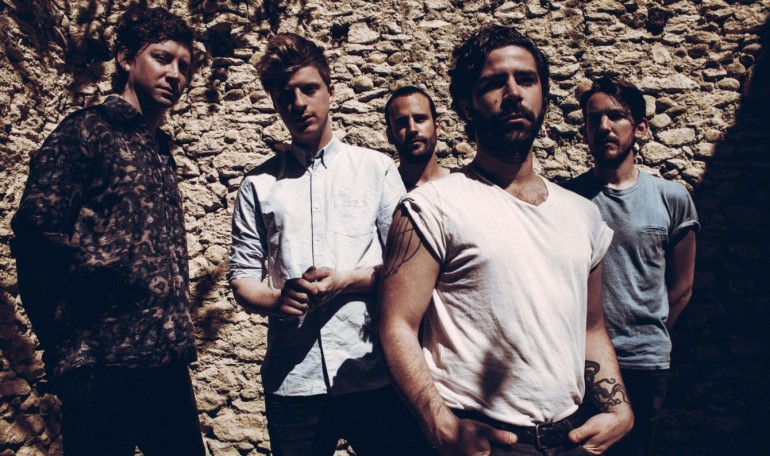
Photo by Nabil
Never trust the first impression, especially when it comes to FOALS. The British indie-rock institution recently reported back with What Went Down, the title-track of their forthcoming fourth studio album and their hardest and most uncompromising single so far. And since 2013’s Holy Fire already featured a few of these heavier elements and keyboarder Ed told us about the band’s general interest in this sound back then we thought we finally get a proper FOALS hard rock record this time.
But, of course, this isn’t the case with the new album that arrives on August 28. What Went Down is surprisingly harmonious and feels quite positive compared to the group’s past musical releases. Was it the changed atmosphere due to the recording sessions in South France? Star-producer James Ford? Or just growing up? NOTHING BUT HOPE AND PASSION sat down with guitarist Jimmy Smith to get a few answers from him regarding that new record and what to expect from it.
Do you like to play with people’s expectations or was it all just about the ‘Bang’ with the first single from the new album?
This time it was definitely all about the ‘bang.’ When we thought about which song we would like to unleash first it was pretty clear that it just had to be this one. It was the most fun to record. It might have caused a few divided opinions but we don’t really care about these things. Still, the feedback was mostly quite positive.
I always wonder why people are surprised about this. Seems a bit like the next logical step to me since you already started that sound on Holy Fire. The last time I talked with Ed he also told me that all of you were interested in continuing this path in the future. And now – except for maybe two songs – What Went Down turned out to be way less rough and angry than I expected it to be. Was that your plan all along?
Being the band we are there’s no way we could deliver a record with just ten such heavy songs. It’s always good to have a few comparisons between those extremes. Ten songs that would have sound similar would have made a boring record. And since we really just have to heavier songs – What Went Down and Snake Oil – on the album they sound even heavier because of their surroundings.
‘We learned from our mistakes’
I remember seeing you two times live in 2013. And you sounded way rougher and furious during the second performance which made me believe you were heading for this louder side of the FOALS. Is it difficult to actually reproduce this sound in the studio?
It sort of became part of our DNA after the last tour. It became a new character of the band and when it came to write new material we had this in the back of our heads. And the song What Went Down in its nasty and menacing form is the best example of it. It was pretty much the first song we did when we went to the studio. We did two live takes and this is actually the first one we ended up with. That was our possibility to put the live energy onto the record. There’s a magic in playing a song for the first time you can’t recreate. We learned that so you have to be really careful to not ruin a song as you’re trying to recreate its naivety. But we also did the other extreme on the album where we record each instrument on its own. Quite scientific process, it is. (laughs)
Do you prefer any of these two extremes?
No, they are both crucial elements of our recording life so, of course, I prefer them both. But we learned from our mistakes this time. On the previous albums we tend to get lost in certain sounds and, you know, went looking for certain synthesizer sounds for days. (laughs) We were much better prepared this time, thanks to our producer James Ford.
Having worked with ARCTIC MONKEYS and MUMFORD AND SONS before he clearly is a big player. What did you learn from working with James?
He emphasized this aspect of preparation. He was like: ‘Finish the songwriting before you go to the studio.’ (laughs) Otherwise you tend to get lost in the possibilities of such a studio. We played the songs over and over again with him, tried out different ideas. And we were always a bit like: ‘Okay, that’s nice, let’s make a decision and go the pub now,’ and he was like: ‘No way. Come on.’ We were working really hard and it’s very helpful to focus the stress on just one period. Then you can get rid of it in the studio.

Photo by Nabil
Of course, Mr. Smith is convinced that What Went Down is the band’s finest full-length so far, also due to the fact that FOALS decided to only put the ten best tracks on the album and not any more. Dramaturgy and coherence have been important elements this time, far more than on Holy Fire with whose track selection the band is a bit unhappy afterwards. This time everyone in the group agreed with every tracklist decision. ‘We had 20 songs in the beginning, recorded 17 and that went down to 12 tracks,’ Smith explains. ‘And I’m glad we made the right decision to pick the ten finest and not more this time.’
The recording sessions in South France were mainly ‘good for the soul’ as Jimmy explains but they might have also affected the sound of the album, especially such tropical grooving pieces like Birch Tree, Night Swimmers and Lonely Hunter. Still, anger, frustration and dark themes are crucial parts in the songs of band leader Yannis Philippakis. The frontman’s dominance in the songwriting sector allows the rest of the group to focus on their territory, although the internal ‘dictator’ sometimes offers an insight into his lyrical soul.
Talking about the lyrics obviously is Yannis’ thing to do but I wonder if he does inform you about their meaning before you head into the studio?
Not on every song but on many, especially if he feels like they should be connected closely to the music. He sometimes sits down and says: ‘Look, this is what the song is about. Just try to keep it in the back of your head when we’re recording the song.’ I think it’s quite helpful.
During my last chat with Ed he described Yannis’ role a bit as positive dictatorship. Would you agree on this?
Yeah, definitely. Otherwise we would have made some really bad decisions. You can get taken advantage of in the music industry quite easily if you’re not strong. There’s a lot of sharks out there, willing to eat you. Yannis scares people… in a good way. He represents all of us in a good way. I sometimes think he must be very tired of fighting for four other guys. (laughs)
‘The next album will be bloody miserable’
Speaking of the sharks. You’ve been with a major label for a while now. Did you have to fight a lot for the idea of FOALS?
It took some time for us to feel comfortable with them, indeed. But nowadays, as the record industry is in crisis, the major labels are a lot smaller than they used to be. An interesting thing happened: all the middlemen, the people you were never really sure what they were doing, they had to go…
It shrunk naturally…
Yeah, exactly. And the people who weren’t good at their job had to leave. That’s a normal thing for a company to do, right? Today some of the indies are much bigger than the majors. The difference disappeared.
A new album also always calls for new tour. It felt like you toured Holy Fire for ages. Are you planning the same amount of gigs this time as well?
It’s weird because we love touring. And if you tour a lot it’s a sign of your band being really healthy and there’s a demand for it. But on the same time it’s spiritually crushing and after a while you just feel pissed. But we’re used to that now. Being pissed about each other only lasts about ten minutes for us. (laughs) Things will definitely change as our bass player just had a child and that might limit how long we’re going to stay away. Still, I got the awful feeling that this tour is gonna be even longer than the last one.
Do you feel the pressure of giving people what they’re asking for? I still think there’s far too many people who are mistaken the FOALS for a feel-good indie-dance band, even seven years after Antidotes…
Yeah, I know what you mean. It’s still happening which is kind of weird because once the shows get bigger one would think the audience gets more diverse. So, there’s more than just the drunk party lads. I still like our debut LP pretty much. I really hate it when bands say they don’t like their earlier stuff anymore. That’s a stupid thing to say.
But it doesn’t affect what songs you pick for the setlist?
No, although it gets harder with the years as you just get more songs. And every time we go on tour we’re like: ‘Okay, let’s make four different setlists and we never do it and end up playing the same one for two years. (laughs) A good setlist should be about your strongest songs live and that’s what we’re trying to achieve with our selection. But the new album is the first one were we can play every song actually live, we think. There’s no song with 55 synthesizer overdubs this time.
We need to cover up the ‘hope and passion’ element, of course. To me, it feels as if What Went Down is your most positive-spirited and bright album so far. Would you agree on that?
Yes, when we were in studio we thought of it as a very colourful record. It’s a celebration of what we’re doing as a band. We didn’t plan that, it just happened. Of course, the next album will be bloody miserable. (laughs)
You already think about the next one?
Yes, always once we finished a record. I mean this one is done, it’s boxed, and it’s the past. We’re always looking forward to the future.
—
